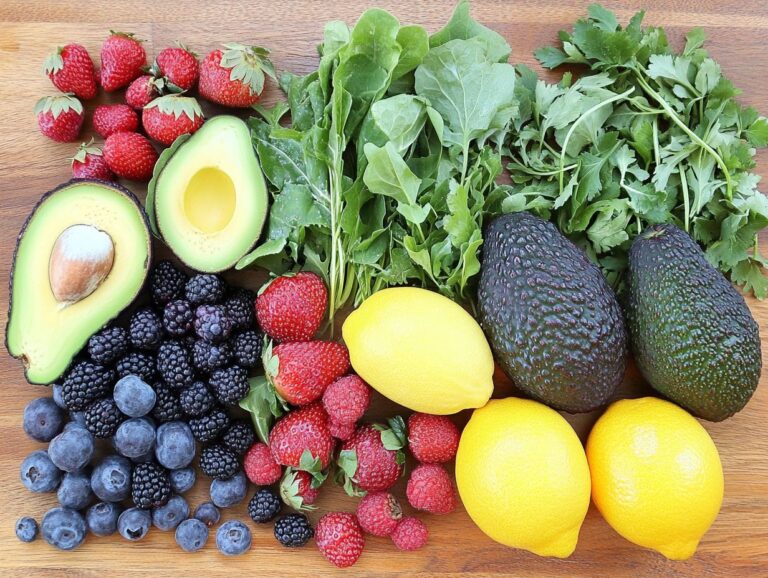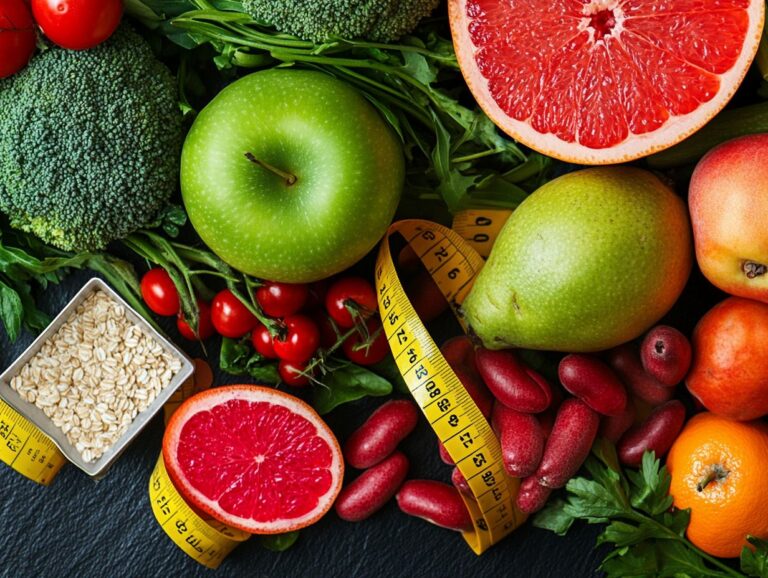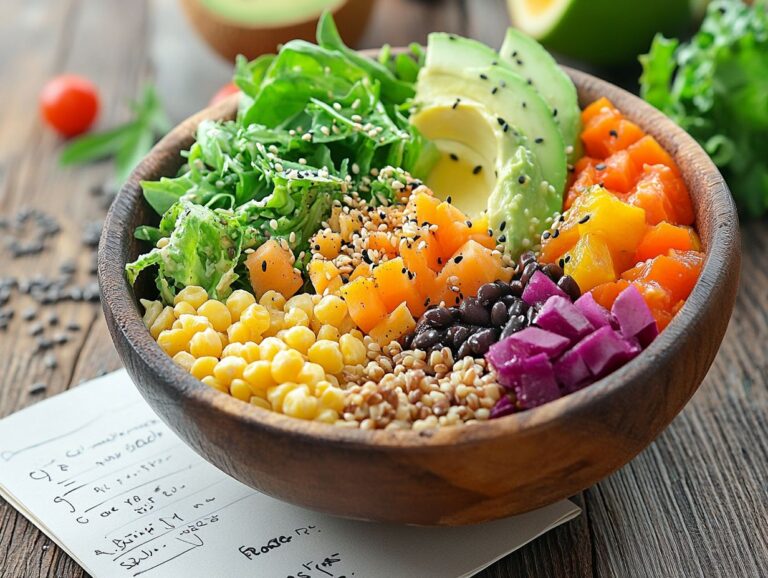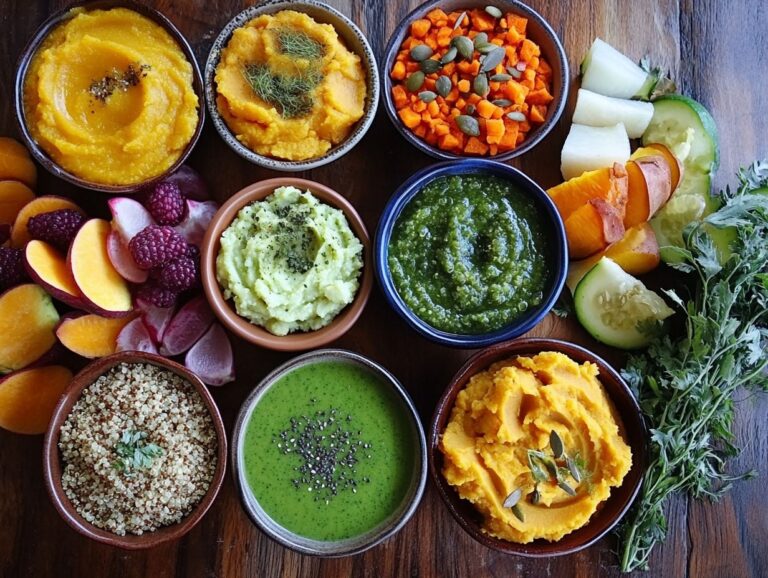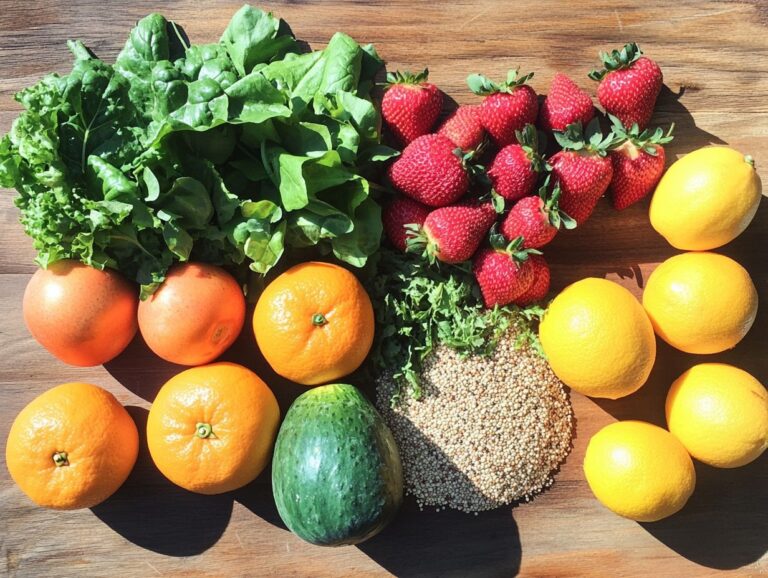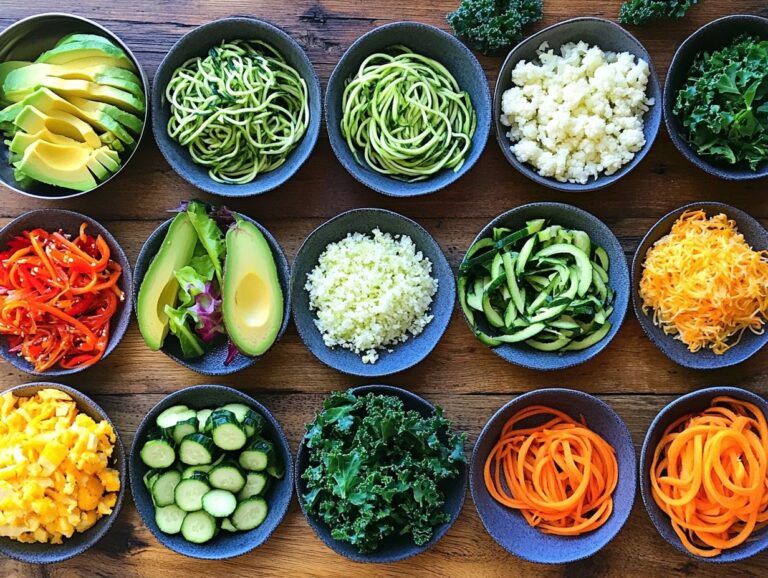Gastroesophageal reflux disease (GERD) can be a frustrating condition; however, adopting a vegan diet may help alleviate its symptoms. This article explores the connection between a plant-based lifestyle and the management of GERD, highlighting foods to avoid as well as those to embrace. By understanding GERD and the principles of a vegan diet, this guide also shares recipes designed to soothe heartburn. It aims to provide delicious options while prioritizing digestive health. Dive in to discover a flavorful path to relief!
Key Takeaways:
- A vegan diet can help alleviate symptoms of GERD by avoiding trigger foods like high-fat, spicy, and acidic foods.
- Vegan GERD-friendly foods include non-citrus fruits, vegetables, whole grains, plant-based proteins, and healthy fats.
- Delicious vegan recipes like quinoa stir-fry, sweet potato with black beans, and lentil soup can be easily incorporated into a GERD-friendly diet.
What is GERD?
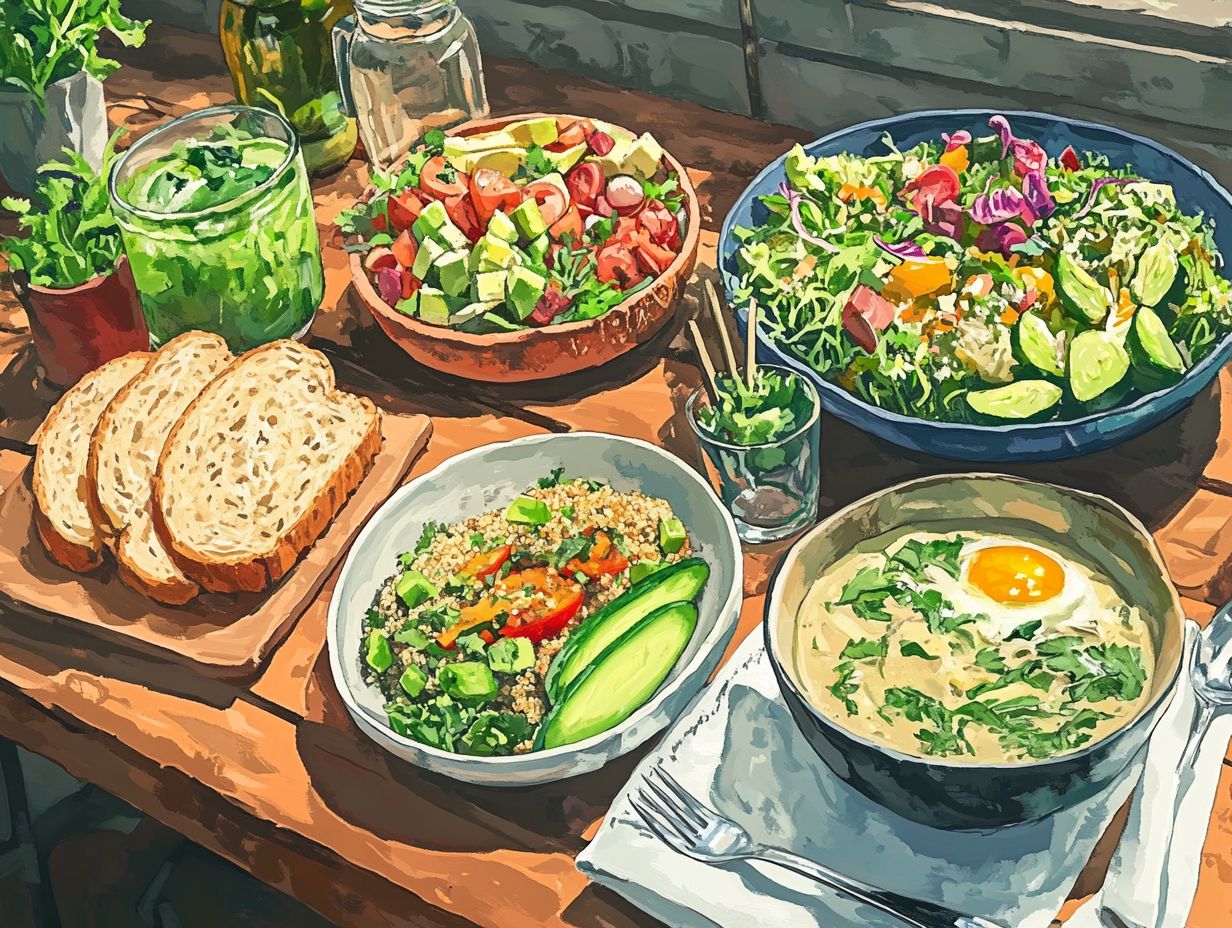 Gastroesophageal Reflux Disease (GERD) is a chronic digestive condition characterized by the backflow of stomach contents into the esophagus, leading to symptoms such as heartburn and acid reflux. GERD can significantly affect a person’s quality of life and is often exacerbated by dietary choices. Understanding GERD involves recognizing how different types of foods can influence the digestive process and acknowledging that dietary modifications can play a crucial role in treatment. Many individuals with GERD seek assistance from healthcare professionals, such as Registered Dietitians or GERD nutritionists, to identify which foods to include or avoid and to develop a meal plan tailored to their specific needs, ensuring adequate intake of nutrients like calcium and vitamin D through options like tofu and almond milk.
Gastroesophageal Reflux Disease (GERD) is a chronic digestive condition characterized by the backflow of stomach contents into the esophagus, leading to symptoms such as heartburn and acid reflux. GERD can significantly affect a person’s quality of life and is often exacerbated by dietary choices. Understanding GERD involves recognizing how different types of foods can influence the digestive process and acknowledging that dietary modifications can play a crucial role in treatment. Many individuals with GERD seek assistance from healthcare professionals, such as Registered Dietitians or GERD nutritionists, to identify which foods to include or avoid and to develop a meal plan tailored to their specific needs, ensuring adequate intake of nutrients like calcium and vitamin D through options like tofu and almond milk.
What is the Vegan Diet?
A vegan diet is a plant-based diet that excludes all animal products, including meat, dairy, and eggs. The primary ingredients consist of vegetables, fruits, nuts, legumes, and whole grains. Many individuals choose a vegan diet for a variety of reasons, including health benefits, ethical considerations, and environmental concerns. A vegan diet that focuses on whole and minimally processed foods can provide essential nutrients, such as proteins and healthy fats. Additionally, plant-based diets are typically high in fiber, which contributes to improved intestinal transit time and overall health. Those who adopt veganism often seek guidance to ensure their nutritional needs are met and that their protein intake is adequate, possibly including protein-rich legumes like chickpeas.
How Does a Vegan Diet Help with GERD?
A vegan diet is beneficial for individuals with GERD because it consists of low-acid and high-fiber foods that promote healthy digestion and alleviate symptoms associated with acid reflux. Whole plant foods, such as vegetables, fruits, legumes, and whole grains, serve as the foundation for meals that are less likely to trigger heartburn and other discomforts related to GERD. This is particularly important for GERD patients, as the alkaline nature of many plant-based foods can help neutralize stomach acidity. As more individuals seek dietary solutions for GERD, the vegan diet emerges as a viable option. High-fiber foods like beans, lentils, and oats enhance digestion and support healthy body weight, both of which are essential for effective GERD symptom management. Additionally, low-acid foods such as melons, bananas, and leafy greens significantly reduce the likelihood of esophageal irritation. By incorporating these food items into their diets, patients can foster a healthier gut environment that minimizes discomfort. Whole grains like brown rice and quinoa provide essential nutrients and help reduce stomach acid production. Ultimately, individuals who transition to a vegan diet may experience a reduction in their GERD symptoms.
What Foods Should Be Avoided in a Vegan GERD Diet?
A vegan GERD diet is designed for individuals with Gastroesophageal Reflux Disease (GERD) and excludes foods that can cause discomfort and worsen symptoms. GERD is a chronic digestive condition characterized by heartburn and acid reflux, which can be aggravated by the consumption of high-fat, spicy, and acidic foods. Those following a vegan diet should be particularly cautious of the following common triggers:
- Chocolate: Chocolate contains methylxanthines, which can relax the lower esophageal sphincter (LES), allowing stomach acid to flow back into the esophagus.
- Caffeine: Similar to chocolate, foods and beverages that contain caffeine can also relax the LES and lead to reflux symptoms. It is advisable to limit caffeinated beverages such as coffee and tea while on a vegan GERD diet.
- Alcohol: Alcoholic beverages can relax the LES, resulting in reflux and heartburn. Additionally, alcohol can increase the production of stomach acid.
By being mindful of these foods, individuals with GERD can better manage their symptoms while adhering to a vegan diet.
1. High-Fat Foods
High-fat foods can significantly exacerbate GERD symptoms by relaxing the lower esophageal sphincter and slowing down the digestion process, which in turn increases episodes of heartburn and acid reflux. Some of these foods, such as avocados, large amounts of nuts, and coconut products, are typically regarded as healthy but can paradoxically cause discomfort for those with acid reflux. These high-fat foods can disrupt optimal digestive function and may also lead to increased sensations of burping or an unpleasant sour taste in the mouth. Instead, individuals experiencing GERD should focus on incorporating healthier low-fat options into their diet, such as leafy green vegetables, legumes, and whole grains.
2. Spicy Foods
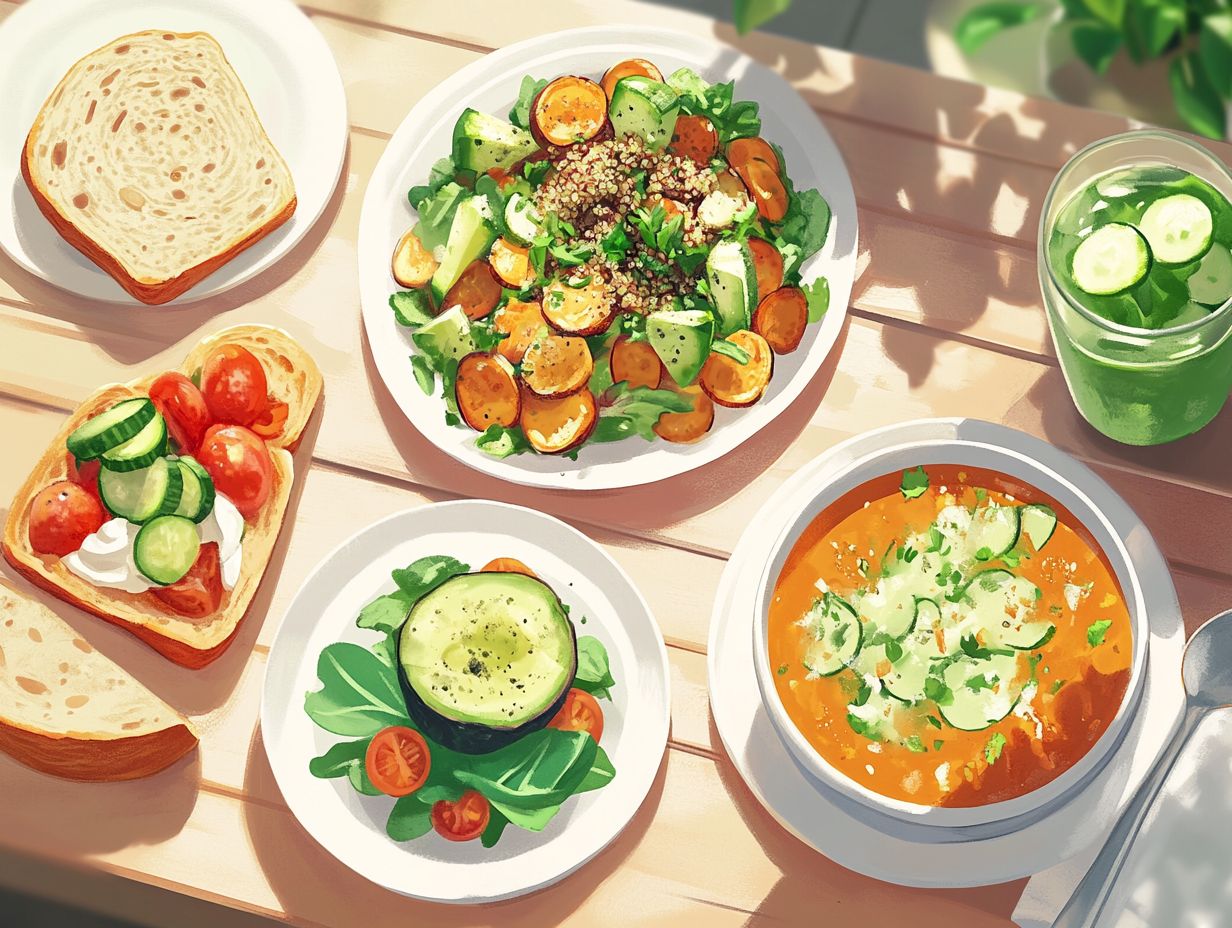 Spicy foods can irritate the esophagus and lead to heartburn in individuals with GERD, making them commonly avoided in a vegan diet. This includes not only hot peppers but also sauces and dishes that contain strong spices such as chili powder, black pepper, and certain curry blends. These ingredients can trigger increased gastric acid production, which may elevate the likelihood of acid reflux and exacerbate symptoms. Instead of using these spicy options, milder herbal teas and flavor alternatives can enhance meals without the risk of GERD discomfort. Herbs like basil, oregano, and thyme add delicious flavors, as do a splash of balsamic vinegar or lemon juice for a refreshing citrusy zing.
Spicy foods can irritate the esophagus and lead to heartburn in individuals with GERD, making them commonly avoided in a vegan diet. This includes not only hot peppers but also sauces and dishes that contain strong spices such as chili powder, black pepper, and certain curry blends. These ingredients can trigger increased gastric acid production, which may elevate the likelihood of acid reflux and exacerbate symptoms. Instead of using these spicy options, milder herbal teas and flavor alternatives can enhance meals without the risk of GERD discomfort. Herbs like basil, oregano, and thyme add delicious flavors, as do a splash of balsamic vinegar or lemon juice for a refreshing citrusy zing.
3. Citrus Fruits
Citrus fruits, such as oranges and grapefruits, are typically high-acid foods that can trigger acid reflux symptoms in individuals with GERD, making them a food group to avoid on a vegan diet. For those who are sensitive, the tangy flavor of these fruits may lead to heartburn or other digestive discomforts. Consequently, individuals following a vegetarian or plant-based lifestyle and managing GERD should consider alternatives that are lower in acidity and gentler on the stomach. Fruits such as bananas, melons, and apples make excellent substitutes, offering sweetness and nutrition without the likelihood of triggering reflux.
4. Tomatoes and Tomato Products
Tomatoes and tomato products are among the most common foods that trigger GERD symptoms, primarily due to their high acidity, which is why they are often excluded from vegan diets. The acidity in tomatoes can lead to an increase in stomach acid, causing discomfort and heartburn in individuals with gastroesophageal reflux disease. Therefore, it is essential for those following a plant-based diet to find alternative flavorful, low-acid vegetables and fruits that can mimic the taste and texture of tomatoes. Incorporating sweet bell peppers, zucchini, and squash into meals are just a few ways to maintain vibrant flavors. Leafy greens such as spinach and kale can provide a similar taste while also offering essential nutrients and promoting digestion. Additionally, using various herbs and spices can further enhance the flavors of these vegetables, helping to create delicious meals that are friendly for those with GERD.
5. Caffeine
Caffeine can be a common trigger for heartburn and acid reflux in individuals with GERD, so an appropriate vegan diet may limit its consumption. This stimulant is present in popular beverages such as coffee, tea, and certain soft drinks, and it can exacerbate symptoms by relaxing the lower esophageal sphincter, allowing stomach acid to escape into the esophagus more easily. In addition to the foods previously mentioned, individuals with GERD should also be mindful of these caffeine sources and their effects on digestive health, as well as avoiding peppermint and chocolate, which can further exacerbate symptoms.
What Foods Should Be Included in a Vegan GERD Diet?
A vegan diet for managing GERD should include specific food types that support a healthy digestive system while minimizing symptoms. Dietary changes such as incorporating alkaline and low-acid foods can significantly benefit those experiencing acid reflux and heartburn. Essential components of a healthy vegan diet include:
- Non-citrus fruits
- A diverse range of vegetables
- Whole grains
- Plant-based protein sources
These foods help keep meals low in acidity while providing the necessary nutrients that individuals need. Additionally, healthy fats from nuts and legumes, as well as high-fiber options, are important, as they offer significant health benefits and promote satiety without triggering heartburn.
1. Non-Citrus Fruits
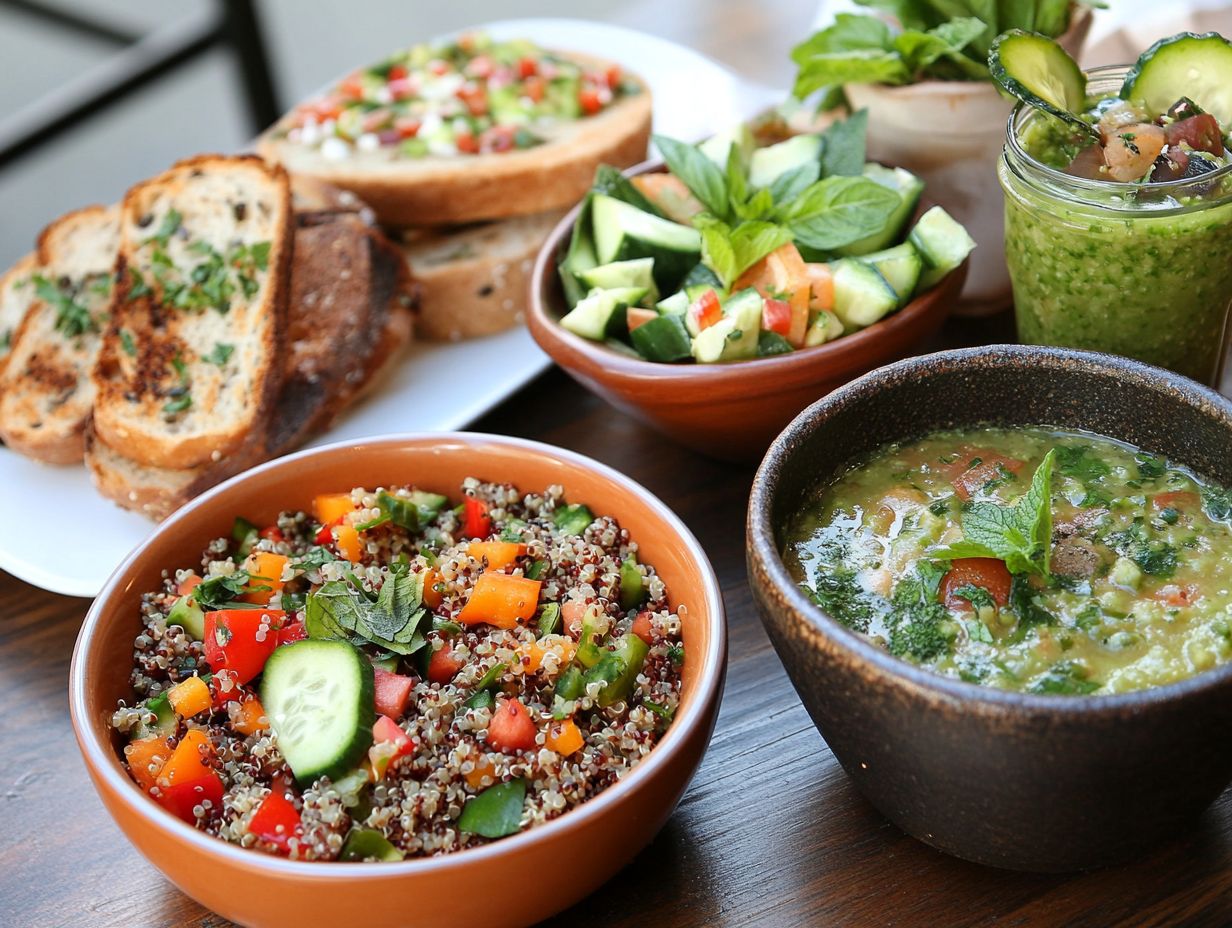 The best fruits for individuals with GERD include bananas, melons, and other non-citrus fruits, as they are low in acidity and can help soothe the digestive tract. These fruits not only provide essential vitamins and minerals but also contribute dietary fiber, which is important for digestive health. Bananas are particularly rich in potassium and promote easy digestion. Additionally, they act as a natural antacid, making them a great snack choice for those prone to heartburn, a common symptom of Gastroesophageal Reflux Disease (GERD). Melons, such as cantaloupes and honeydew, are hydrating and gentle on the stomach, enhancing overall comfort. Both bananas and melons can be easily incorporated into daily meals; for instance, they can be added to smoothies, sprinkled on top of oatmeal, or included in fruit salads. Apple slices with almond butter and a melon salad are excellent snack options that can help satisfy cravings without aggravating GERD symptoms.
The best fruits for individuals with GERD include bananas, melons, and other non-citrus fruits, as they are low in acidity and can help soothe the digestive tract. These fruits not only provide essential vitamins and minerals but also contribute dietary fiber, which is important for digestive health. Bananas are particularly rich in potassium and promote easy digestion. Additionally, they act as a natural antacid, making them a great snack choice for those prone to heartburn, a common symptom of Gastroesophageal Reflux Disease (GERD). Melons, such as cantaloupes and honeydew, are hydrating and gentle on the stomach, enhancing overall comfort. Both bananas and melons can be easily incorporated into daily meals; for instance, they can be added to smoothies, sprinkled on top of oatmeal, or included in fruit salads. Apple slices with almond butter and a melon salad are excellent snack options that can help satisfy cravings without aggravating GERD symptoms.
2. Vegetables
A vegan GERD diet, recommended by a GERD nutritionist or Registered Dietitian, can greatly benefit from a variety of vegetables, particularly leafy greens and root vegetables, as they aid in digestion and provide essential nutrients. Vegetables such as spinach, kale, carrots, and sweet potatoes are rich in fiber and low in acidity, which is crucial for maintaining a healthy digestive system. Leafy greens like spinach and kale can be enjoyed raw in salads or blended into smoothies, while root vegetables such as carrots and sweet potatoes can be roasted or mashed. These vegetables have soothing effects on the stomach lining, which can help alleviate GERD symptoms. Additionally, incorporating herbs like ginger or turmeric can enhance their anti-inflammatory properties.
3. Whole Grains
Whole grains, such as quinoa, brown rice, and oats, are essential components of a vegan diet designed to manage GERD. These high-fiber foods support digestive health and can help prevent acid reflux. Incorporating these healthy grains into meals throughout the day can significantly enhance the overall health and comfort of individuals affected by GERD. For instance, oatmeal topped with fresh fruits makes for a nutritious and satisfying breakfast, while whole-grain pasta and quinoa salads can serve as excellent replacements for refined carbohydrates, offering a healthy source of fiber. Whole-grain bread is another convenient way to add fiber to various meals throughout the day, which is particularly beneficial for those suffering from GERD. These grains not only taste great but also contribute to a balanced high-fiber diet by helping to lower acidity and promote healthy digestive function, which is essential for managing GERD symptoms.
4. Plant-Based Proteins
Plant-based proteins such as legumes, tofu, and chickpeas are nutritious additions to a vegan diet for managing GERD, as they provide essential nutrients without exacerbating acid reflux symptoms. These proteins are rich in a variety of vitamins and minerals, making them important components of a balanced diet that can help alleviate GERD symptoms. Incorporating these ingredients can reduce the frequency of GERD flare-ups and enhance meal satisfaction. For those looking to include plant-based proteins, preparation tips include:
- Soaking legumes overnight to improve digestibility
- Using gentle cooking methods such as steaming or saut ing with low-acid vegetables
Delicious and GERD-friendly meal options include a chickpea salad with cucumbers and avocados or a tofu stir-fry featuring bell peppers and spinach, both of which are satisfying and nutritious. Seeking guidance from a GERD nutritionist or Registered Dietitian, such as those at Zaya Care, can further enhance meal planning strategies.
5. Healthy Fats
In a vegan GERD diet, consuming healthy fats from nuts and seeds is beneficial because they provide essential fatty acids that promote overall health without exacerbating symptoms. These fats, including omega-3 and omega-6 fatty acids, play a crucial role in reducing inflammation and improving heart health. Avocados and olive oil are excellent sources of healthy fats, adding creamy textures and rich flavors to meals. To incorporate these fats into your diet, consider:
- Adding a sprinkle of chia seeds to a smoothie,
- Drizzling a bit of olive oil over a fresh salad, or
- Blending ripe avocados into creamy dips.
This approach not only enhances flavor but also ensures that the body receives vital nutrients as part of a balanced diet, which may help alleviate discomfort associated with GERD.
Delicious Vegan GERD Diet Recipes
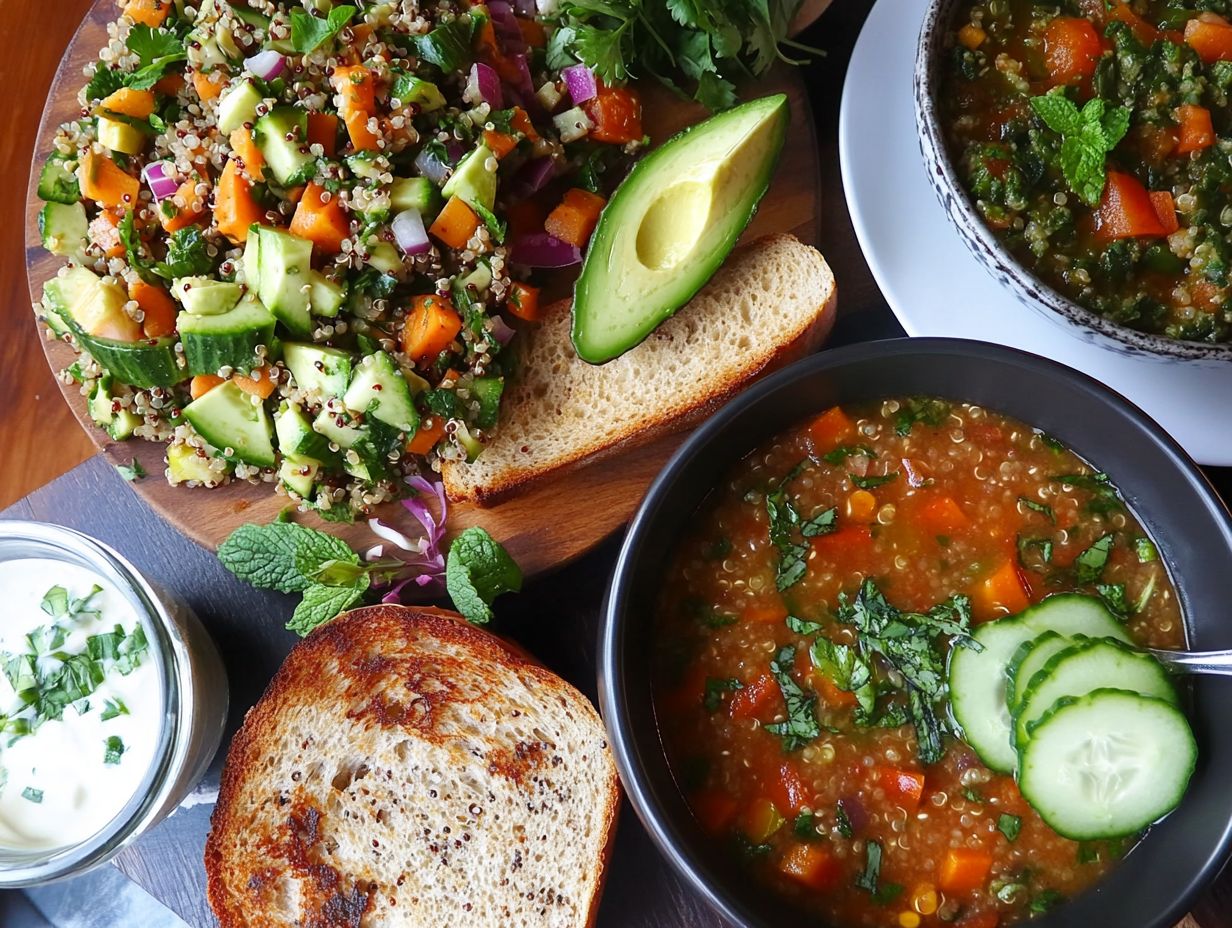 Vegan GERD diet recipes offer a way to enjoy delicious meals while maintaining a good nutritional balance. Ingredients such as quinoa, lentils, tofu, and chickpeas can be used to create flavorful dishes that meet the requirements of a GERD diet while minimizing discomfort. These recipes are typically higher in fiber and promote the intake of a variety of vegetables, utilizing plant-based proteins. This not only aids digestion but also contributes to overall health. Below are some vegan recipes that are suitable for the GERD diet.
Vegan GERD diet recipes offer a way to enjoy delicious meals while maintaining a good nutritional balance. Ingredients such as quinoa, lentils, tofu, and chickpeas can be used to create flavorful dishes that meet the requirements of a GERD diet while minimizing discomfort. These recipes are typically higher in fiber and promote the intake of a variety of vegetables, utilizing plant-based proteins. This not only aids digestion but also contributes to overall health. Below are some vegan recipes that are suitable for the GERD diet.
1. Quinoa and Vegetable Stir-Fry
Quinoa and vegetable stir-fry is an ideal vegan dish that is both nutritious and friendly for those with GERD. It combines the protein-rich benefits of quinoa with a variety of vegetables. This dish not only supports a healthy lifestyle but also presents a vibrant array of flavors and textures that make every bite enjoyable. The preparation begins by rinsing the quinoa thoroughly, which helps remove any bitter saponins, followed by cooking it until fluffy. Meanwhile, a medley of vegetables such as bell peppers, broccoli, and carrots can be saut ed in a splash of olive oil, enhancing their natural sweetness. These ingredients are packed with vitamins, minerals, and antioxidants, promoting overall well-being. For those looking to personalize their meal, adding tofu for extra protein, incorporating different vegetables, or tossing in some herbs and spices for added zest can transform this simple stir-fry into a unique culinary creation.
2. Baked Sweet Potato with Black Beans and Avocado
A baked sweet potato topped with black beans and avocado is an easy and satisfying vegan meal that is gentle on the stomach while providing essential nutrients. This dish not only features a delightful combination of flavors but also offers a wealth of health benefits. To prepare it, simply bake the sweet potato until it is tender, allowing its naturally sweet flavor to develop. Meanwhile, rinse the black beans and warm them on the stove; they provide a hearty source of protein that complements the sweet potato’s starchiness. The avocado, rich in healthy fats, adds creaminess and a boost of heart-healthy nutrients. Together, these ingredients create a nourishing meal that supports a vegan GERD diet by being low in acidity and high in dietary fiber, promoting digestive health and overall well-being.
3. Lentil and Vegetable Soup
Lentil and vegetable soup is a comforting and nourishing choice for those following a vegan GERD diet. Lentils are low in acidity while providing fiber and protein, making this dish both satisfying and beneficial for digestive health. The combination of lentils and a variety of vegetables such as carrots, celery, and spinach creates a delightful medley of flavors and textures, resulting in a hearty meal. The dietary fiber from the lentils aids digestion, while the vegetables contribute essential vitamins and minerals. This soup can be a daily staple for anyone managing GERD symptoms, as it offers a warming, low-fat option that can help alleviate discomfort. Consulting a GERD nutritionist or Registered Dietitian can provide additional insights into optimizing the recipe for digestive health. Now, let s explore the simple recipe that will make preparing this wholesome soup an enjoyable experience.
4. Tofu and Vegetable Curry
A tofu and vegetable curry can be a delicious and satisfying meal for individuals with GERD, as it is rich in plant-based protein and nutrient-dense vegetables while remaining low in acidity. Firm tofu is the best choice for this dish because it holds its shape during cooking and absorbs the spices effectively. To prepare the curry, saut a combination of fresh vegetables, such as spinach, bell peppers, and zucchini, in a small amount of low-sodium vegetable broth. For added flavor, season the curry with mild, GERD-friendly spices like turmeric, ginger, and coriander, all of which possess anti-inflammatory properties. Tofu serves as an excellent source of plant-based protein and provides essential nutrients such as calcium and iron. The combination of these ingredients results in a wholesome dish that is both delicious and nutritious, ensuring that the meal avoids GERD triggers.
5. Chickpea and Vegetable Salad
Chickpea and vegetable salad is a vegan, GERD-friendly dish that is gentle on the stomach while providing essential proteins and fibers. The inclusion of a variety of colorful vegetables, such as cucumbers, bell peppers, and cherry tomatoes, not only enhances the salad’s visual appeal but also boosts its nutritional content. Chickpeas serve as an excellent source of plant-based protein, and their high fiber content promotes healthier digestion. This simple salad can be prepared by rinsing and draining canned chickpeas and combining them with diced salad vegetables of your choice in a large bowl. A basic dressing made of olive oil and lemon can enhance the flavors, but you can also customize your salad with herbs like parsley or spices like cumin. This flexibility allows anyone to tailor the salad to their individual taste while keeping in mind digestive comfort and nutritional value.
How to Incorporate These Recipes into Your Vegan GERD Diet?
Incorporating vegan recipes into a GERD diet can enhance both flavor and health. This approach to meal planning encourages individuals to make necessary adjustments to their GERD diet at a comfortable pace, promoting improved digestive health. By dedicating time to create a meal plan that includes a variety of recipes, such as:
- quinoa and vegetable stir-fry
- baked sweet potatoes with black beans
- lentil soup
Individuals can ensure their meals are not only GERD-friendly, which helps manage Gastroesophageal Reflux Disease, but also aligned with their nutritional needs and personal preferences, possibly with the guidance of a GERD nutritionist. To seamlessly integrate vegan recipes for GERD into daily meals, it is beneficial to set aside a few hours each week for grocery shopping and meal preparation. Consider consulting a Registered Dietitian to ensure you’re meeting all nutritional needs, including adequate vitamin D intake. Dishes like lentil soup or tofu stir-fry can be prepared in larger batches and stored in portion-sized containers for convenient reheating throughout the week. When planning meals, it is helpful to include fresh, flavorful, and easy-to-digest ingredients such as zucchini, carrots, and spinach. This approach not only maintains a varied diet and keeps mealtime interesting but also ensures that all essential nutrients are consumed daily. With a bit of time management and creativity, following a GERD-friendly vegan diet can be both simple and delicious. Companies like Zaya Care provide resources that can further simplify this dietary transition.
